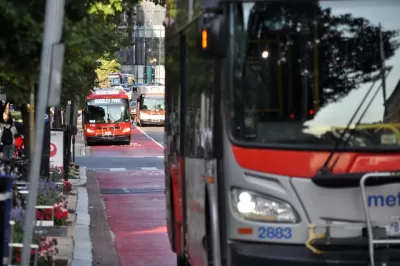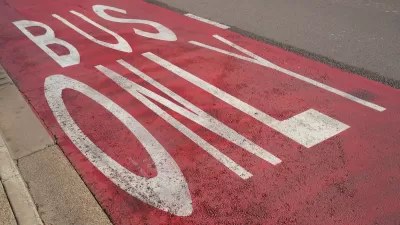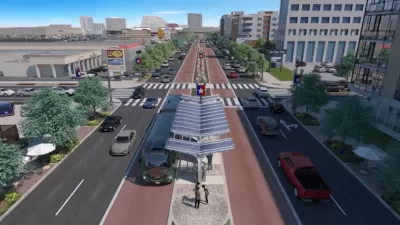A new plan from DDOT describes 51 bus priority projects aimed at improving service and making transit accessible to more D.C. commuters and residents.

A Bus Priority Plan released by the Washington D.C. District Department of Transportation (DDOT) "lays out an interactive map and high-level plan for delivering 51 bus priority projects for the District, in a nod to DC’s ongoing bid to become the 51st state." According to reporting by Caitlin Rogger, the agency says the plan could improve service for 110,000 riders each day by expanding the District's network of dedicated bus lanes. "DDOT’s Acting Director Everett Lott said the bus priority plan will make it easier for DC residents and workers to access jobs and services without a car."
Aside from dedicated lanes, transit agencies can improve bus service by prioritizing buses through signal priority, reviewing bus stop locations, and implementing all-door boarding to make boarding faster and more efficient. Meanwhile, other tools such as congestion pricing can help shift mode share from private vehicles to buses(or biking or walking).
"More reliable and efficient bus trips can be great for equity, as more than half of Metrobus riders live in low-income households, and 81% identify as people of color. Whereas historically rail systems, including ours, have favored the needs of wealthier, whiter commuters, focusing on buses sends a different message."
FULL STORY: New year, new bus priority plan for DC

Maui's Vacation Rental Debate Turns Ugly
Verbal attacks, misinformation campaigns and fistfights plague a high-stakes debate to convert thousands of vacation rentals into long-term housing.

Planetizen Federal Action Tracker
A weekly monitor of how Trump’s orders and actions are impacting planners and planning in America.

In Urban Planning, AI Prompting Could be the New Design Thinking
Creativity has long been key to great urban design. What if we see AI as our new creative partner?

Massachusetts Budget Helps Close MBTA Budget Gap
The budget signed by Gov. Maura Healey includes $470 million in MBTA funding for the next fiscal year.

Milwaukee Launches Vision Zero Plan
Seven years after the city signed its Complete Streets Policy, the city is doubling down on its efforts to eliminate traffic deaths.

Portland Raises Parking Fees to Pay for Street Maintenance
The city is struggling to bridge a massive budget gap at the Bureau of Transportation, which largely depleted its reserves during the Civd-19 pandemic.
Urban Design for Planners 1: Software Tools
This six-course series explores essential urban design concepts using open source software and equips planners with the tools they need to participate fully in the urban design process.
Planning for Universal Design
Learn the tools for implementing Universal Design in planning regulations.
Gallatin County Department of Planning & Community Development
Heyer Gruel & Associates PA
JM Goldson LLC
City of Camden Redevelopment Agency
City of Astoria
Transportation Research & Education Center (TREC) at Portland State University
Jefferson Parish Government
Camden Redevelopment Agency
City of Claremont





























